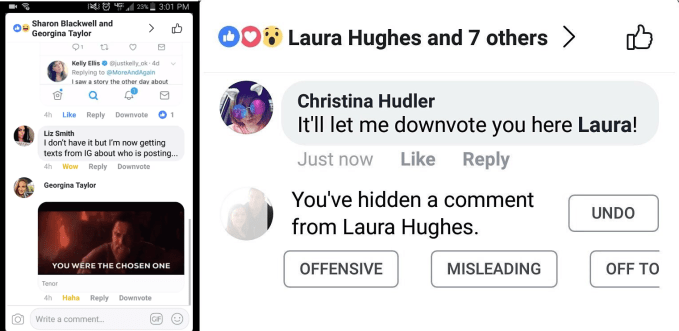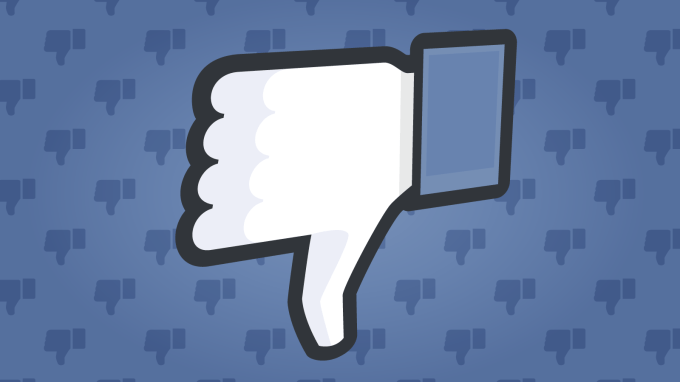How can Facebook promote meaningful interaction between users? By making them downvote inappropriate comments to hide them. Facebook is now researching a downvote button on a limited set of public Page post comment reels, the company confirms. But what Facebook does with signals about questionable notes could grow new the issue of censorship, and its role as a news editor and media company.
A Facebook spokesperson tells that the motivation behind the downvote button is to create a lightweight channel for parties to render a signal to Facebook that specific comments is inappropriate, uncivil, or misleading.
Here’s the statement Facebook catered: “We are not experimenting a dislike button. We are examining a feature for beings to pay us feedback about notes on public sheet poles. This is running for a small set of people in the U.S. only.”
This is what the downvote button looks like up close :P TAGEND![]()
When sounded, the downvote button conceals a comment, and causes customers added reporting options like “Offensive”, “Misleading”, and “Off Topic”. Those were gonna help Facebook figure out if the comment is abhorrent, a species of “fake news”, or precisely insignificant. Facebook already has a “Hide” button for remarks, but it’s generally concealed behind the drop-down arrow on remarks rather than immediately clickable.
Here you can see the downvote button on specific comments yarn, plus what happens when you click it. The screenshots come from Christina Hudler .
According to Facebook, this is a short-term assessment that doesn’t change the rank of specific comments, pole, or Page. It’s designed as a route to give feedback to Facebook , not the commenter, and there will be no publicly conspicuous count of how many downvotes a comment gets. The assessment is feed for 5% of Android consumers in the U.S. with communication set to English. The downvote button only appears on public Page uprights , not on berths by Groups, public figures or customers. There’s currently no plan to expand the test as is.
Not A Dislike Button
A dislike button have so far been the most sought Facebook feature, but Facebook "ve never" given in.
Back in 2015, CEO Mark Zuckerberg responded to a Q& A interrogate about it, saying :P TAGEND
“We didn’t want to merely build a Dislike button because we don’t want to turn Facebook into a forum where people are electing up or down on people’s poles. That doesn’t seem like the various kinds of parish we want to create.”
Instead, Facebook improved the Reactions alternatives that let you respond to posts and comments with adoration, wow, haha, unfortunate or annoyed emoji. Facebook too improved actions into Messenger with the option to give messages a thumbs-up or thumbs-down so you could demonstrate arrangement or disagreement.

But the new downvote button is the closest Facebook has come to actually leaving parties a dislike button. Downvoting was popularise on Reddit for crowdsourcedcomment ranking. Reddit co-founder Alexi Ohanian weighed in on Facebook’s version via Twitter :P TAGEND
https://twitter.com/alexisohanian/status/961722334192300035?ref_src=twsrc%5Etfw
The downvote button ties in with Facebook’s recent push to enhance its users’ well-being by prioritizing News Feed content that drives meaningful interactions instead of passive, zombie browsing. That preceded Facebook to show fewer viral videos, which in turn contributed to a 700,000 consumer decrease in U.S. and Canada daily active customers -- its firstly lessen ever anywhere -- and Facebook’s slowest DAU growth rate it’s ever reported.
But one highway Facebook could make more meaningful interaction without misplacing season on site could be by ensuring the most interesting observes are at the top of posts. Facebook once ranks mentions by relevancy based on Likes and answers. But the downvote button could ensure that if abhorrent comments rise up and stall deliberation, Facebook will know.
That going to be able to lead to a channel for Facebook to inter these comments, or the people that post them. Nonetheless, this will exclusively open up more questions about censoring and what prepares as inappropriate at a time when Facebook is already struggling to manage its responsibilities as what Zuckerberg announces “not a usual media company.”
No comments:
Post a Comment